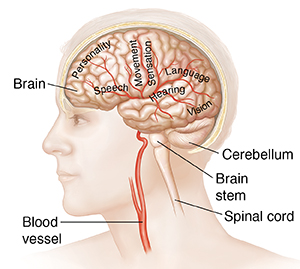A
B
C
D
E
F
G
H
I
J
K
L
M
N
O
P
Q
R
S
T
U
V
W
X
Y
Z
Click a letter to see a list of conditions beginning with that letter.
Click 'Topic Index' to return to the index for the current topic.
Click 'Library Index' to return to the listing of all topics.
What the Brain Does
Your brain controls your breathing, heart rate, digestion, temperature, your 5 senses, and movement. Your brain also allows you to think, communicate, handle emotions, and make judgments. And it has many other critical functions.

Roles of each area of the brain
Each part of your brain has a different role:
-
The front of the brain is the center for emotions, intelligence, and reasoning. This is where much of your personality comes from. Memory is mainly stored in both temporal lobes.
-
The right side of your brain controls the muscles and sensation on the left side of your body. The right side also directs problem-solving and spatial skills, such as judging distance and recognizing faces. It handles many artistic and imaginative activities.
-
The left side of your brain controls the muscles and sensation on the right side of your body. It also handles most verbal or language skills.
-
The brain stem handles basic body functions, such as breathing, blood flow, and swallowing. It also controls the movement and senses of your eyes, face, and head and neck muscles. This includes swallowing, taste, and hearing.
-
The back of your brain (occipital lobes) controls vision.
-
The cerebellum is the part of your brain just below your visual cortex. It controls coordination and helps with balance and movement.
Online Medical Reviewer:
Stacey Wojcik MBA BSN RN
Date Last Reviewed:
4/1/2024
© 2000-2025 The StayWell Company, LLC. All rights reserved. This information is not intended as a substitute for professional medical care. Always follow your healthcare professional's instructions.